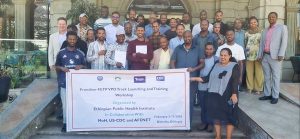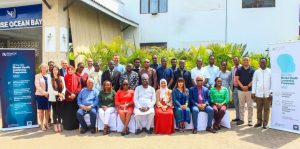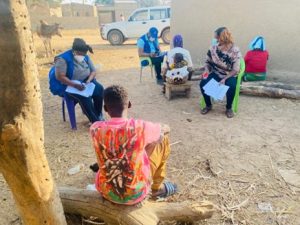Sierra Leone FETP building the capacity of its graduates and current trainees on manuscript writing and peer-review
-
by
AFENET


The Sierra Leone Field Epidemiology Training Program (SLFETP)/African Field Epidemiology Network (AFENET) Sierra Leone with technical and financial support from the United States Centers for Disease Control and Prevention (US CDC), collaborated with the Ministry of Health, the National Public Health Agency (NPHA), and the Sierra Leone University/ Sierra Leone Biomedical Research Journal (SLBRJ) to successfully complete a collaborative Scientific Manuscript Writing and Peer-review Workshop from July 15 – 19, 2024 at the Atlantic Hotel in Freetown. The workshop was aimed to enhance the capacity of SLFETP trainees and graduates in manuscript writing and publishing by submitting manuscripts to the SLJBR.
This workshop followed a unique scientific approach where the SLJBR Editorial team invited senior researchers and academicians to edit and review manuscripts submitted by the SLFETP trainees and graduates. A total of 30 participants comprising principal investigators, reviewers and SLJBR editorial team, took part in the workshop.
The SLFETP trainees and graduates were able to submit 14 high-quality manuscripts to the SLJBR with the aim of publishing these manuscripts as special supplement for the FETP program. The review process was facilitated by renowned academicians and researchers from the University of Sierra Leone, the University of Makeni, Njala University, Milton Margai Technical University, and the Research Unit at the Partners in Health. The review process was blinded, where the principal investigator did not know who was reviewing his/her manuscript, and the reviewers did not know the principal investigator of the manuscript that he/she reviewed.
The collaborative Manuscript Writing and Peer-Review workshop contributed to enhancing the skills of participants in scientific writing and peer review and the crucial aspects of disseminating high-quality public health research. The workshop provided hands-on training and fostered collaboration among participants, ultimately contributing to overall scientific writing and publishing.
Reflections
Prof. Roland Suluku a senior professor in Njala University:
“During the Ebola outbreak, few Sierras Leoneans were published, and majority were people that they are not in this country. So, if we have started this manuscript writing and review process with AFENET and US CDC supporting Sierra Leonean writers to collect data and publish, that will be goog. It is crucial to have our Sierra Leone Journal for which all of us should be contributing this is a first-of-its-kind strategy that saw reviewers and principal investigators in the same hall and working on the same manuscripts.”
Binta Bah is FETP graduate and a principal investigator:
“In Sierra Leone we have a lot of data but writing and publishing by Sierra Leoneans are not usual. This workshop provided a good opportunity to showcase what we are doing so far Sierra Leonean talents in the field of science and epidemiology in Sierra Leone. On of the challenge we face is the writing skills, in Sierra Leone we know a lot but put it in pen and paper is a challenge and learn a lot through the SLFETP because it is in-service and competency-based training. In science, which is not written is not don, and if do not publish you perish.”
Prof Njai the SLJBR Managing Editor:
“In Sierra Leone, we have a lot of data, but we are not publishing. What we have done here serves several purposes; first, we get publication from Sierra Leone. You are building your capacity to publish. The second, we are improving reviewers pool as the pool of reviewers are going to increase after this workshop.”
AFENET/SLFETEP Resident Advisor, Dr. Gebrekrstos Negash Gebru:
“Sierra Leone has a new National Public Health Agency, and research is one of the technical areas under this new agency. This workshop contributes to building the capacity of the agency and ensures the agency to have human resource for research and public health system strengthening. So, one of the core mandates of AFENET in Sierra Leone is to support the NPHA in strengthening its public health workforce which in turn contributes to the overall mission of the Government that is the human capital development. The five-day interactive sessions proved that Sierra Leone has a new generation of scientists who can not only design and implement epidemiological studies, but also write articles to publish their work.”
Dr Monique Foster, Ag. Country Director, US CDC Office in Sierra Leone:
“In Ebola time all the papers came out there was no Sierra Loenen and in all these papers they were doing a lot of work. Also, to reflect that Sierra Leone has built its public health capacity weather through FETP and other programs, not only CDC but other partner’s support. During the COVID-19 pandemic, we did not massive influx of thousands international people to do that work because Sierra Leone has built its capacity. The same comes for scientific publication, you must build that capacity to share that story as well. We do not want someone to write that work for you, we want to do that work yourself. We do not want someone to write that work for you, and someone else to become a model for the work that you did.”
Dr. Mohamed Jalloh, Director of Research at the National Public Health Agency:
“Where we are now, I must say, is a long way from where we were ten years ago. When Ebola Stroke there was little on research, and as a country we say stunning publication going out there and the primary author were not a Sierra Leonean. With COVID-19 things changed, thanks to programs like SLFETP program, and I know in any subsequent outbreaks or pandemics will have a lot of publications coming out from Sierra Leone.”







